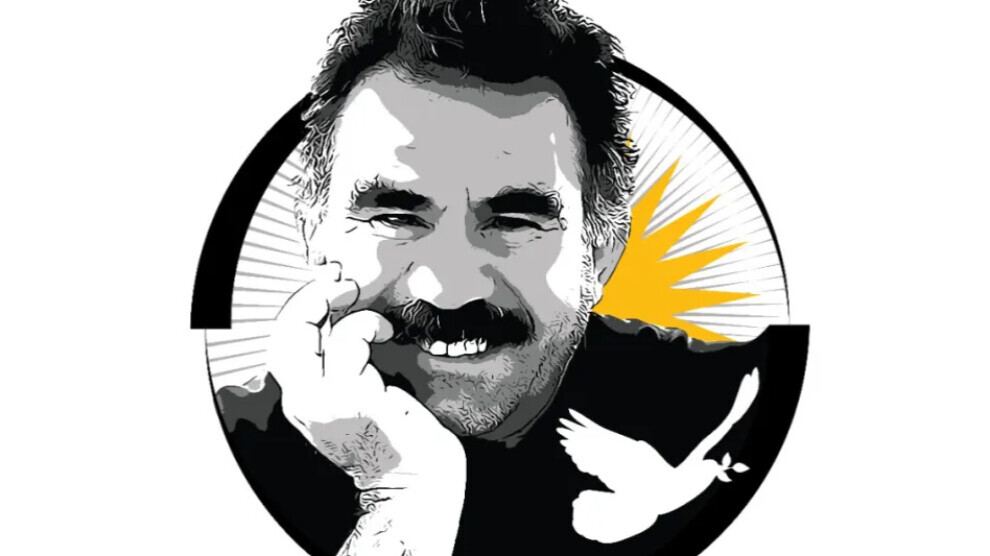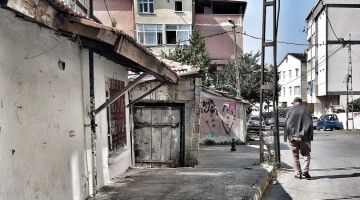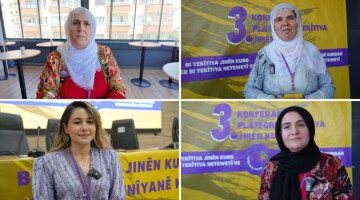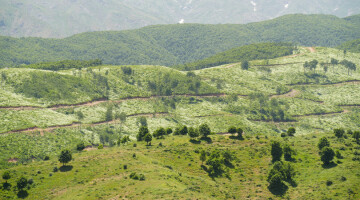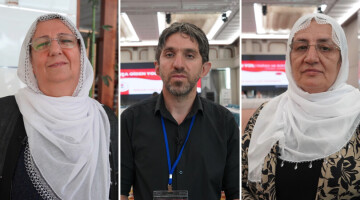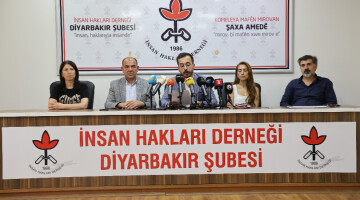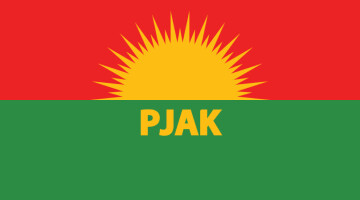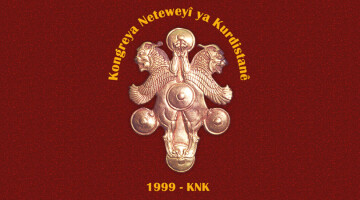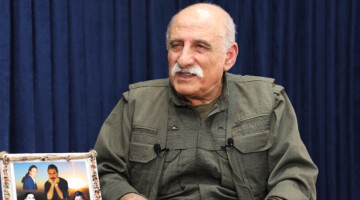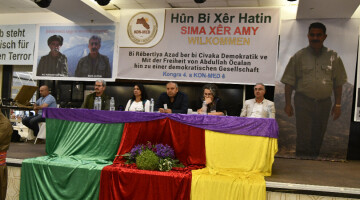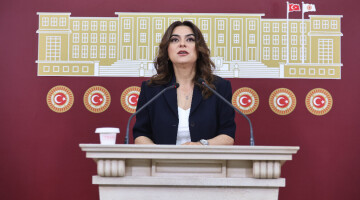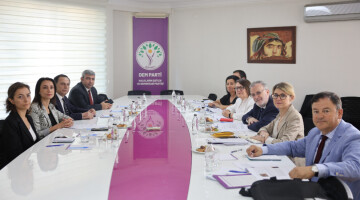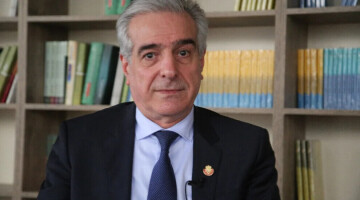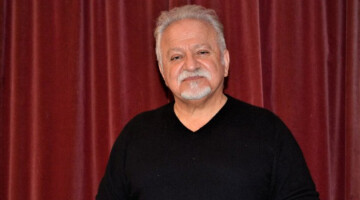Kurdish leader Abdullah Öcalan has been held in the high security prison on the island of Imralı since February 15, 1999, when he was kidnapped in Kenya and taken against his will to Turkey. Lawyers have not heard from him, nor from the other three clients who are currently in that same “special” prison after the interrupted phone call on March 25, 2021. Since then, Öcalan and three his fellow inmates have not met with a lawyer, nor family visits, not a phone call, not a fax, not a letter. The last family meeting with Öcalan was on April 27, 2020, and the last meeting with his lawyers from the Istanbul-based Asrın Law Office dates back to August 7, 2019, more than 4 and a half years ago.
The lawyers of Kurdish People's Leader Abdullah Öcalan, who held a series of meetings with European Union institutions in Strasbourg, France, also met with the Council of Europe’s Committee for the Prevention of Torture (CPT).
İbrahim Bilmez, one of the lawyers who took part in the meeting, spoke to Sarah Glynn on the occasion of the 25th anniversary of Öcalan’s abduction in a CIA-led international plot and his imprisonment on Turkey’s İmralı Island. We publish below the in-depth interview, which was originally published on Ocalan Vigil website.
Can you explain to a non-Kurdish readership why Ocalan is so important?
He is someone who could change the destiny of the Kurds. The Kurds were denied their identity. Their homeland was divided into four parts, and they were regarded as though they didn’t exist as a people. The Turkish Republic was founded on this understanding. You have to imagine a society of millions of people whose existence was not acknowledged. After the founding of the republic, there were Kurdish uprisings in different parts of Kurdistan, and then, for a long time, all went quiet. The Kurds were giving up. They had developed a sick personality that denied and ran away from their own identity, that was ashamed of who they were.
In the 1970s, when Mr Öcalan and his comrades began to defend their rights, Kurds recovered their self-belief and their hope. They soon organised around his group, and from that time to this many things have changed – especially when you remember that it was a feudal and religious society. Women have become much more empowered – at least they have begun to struggle for their own freedom. And in a place such as the Middle East, that’s something very important.
In all this time, Mr Öcalan didn’t limit himself to the Kurdish question. He developed solutions and perspectives for the whole Middle East; also, ways to overcome the nation-state and the problems it creates. Historically, the Kurdish issue has always been overshadowed by Palestine, but the solution that Mr Öcalan is giving is much bigger than the situation in Palestine, because it is a solution not only for the Middle East but for the whole world. This is an answer to your question. Mr Öcalan has the best proposals for a realistic solution for the Middle East and even beyond: a solution that is reasonable, realistic and progressive. As someone who has had the luck to meet with him – and as a lawyer I met him many times – I know he is honest when he is offering a solution; and the Turkish state itself accepted this. For all of these reasons, he is important for everyone.
I read that last time that Öcalan met with his lawyers – in 2019 – he said he could solve the Kurdish question in a week. What did he mean by that?
Following on from my first answer, Mr Öcalan knows that he has vast knowledge about Turkey, Kurdistan, and the Middle East. He trusts himself. He knows the Kurdish community. He knows how they live in big families and the character of the society. He knows that these types of problems are resolvable, and that he could do it in a very short time. When he says a week, he means this would not be difficult for him because he has deep knowledge and experience. Of course, he knows that there is huge support from the Kurdish community and beyond. He says that the most important thing is for there to be someone honest and serious facing him, who is also looking for a serious solution.
There is also the experience of the period from 2013 when the peace process started, when the guerrilla forces were withdrawn from the front, and Ocalan sent a group for peace to Turkey. There was a commission made of wise people who were holding meetings and travelling. These were his ideas. From İmralı, he carried out research into other countries – Ireland and South Africa and others – to understand other peace processes and learn from others’ mistakes. One important proposal of his was to create a committee of truth searchers – a truth commission – to research what has happened and to clarify what has been done by the Kurdish Freedom Movement itself and what is the result of other forces, such as the deep state, carrying out operations in the Movement’s name. Mr Öcalan was saying that he can do it, that he has the power to resolve the Kurdish Question.
As a lawyer, your role is to pursue the legal avenues, but, at the same time, we have a lot of people campaigning and out on the streets, so how can that campaigning help make Tukey do things by the law?
The case of Mr Öcalan is a big case because it is related to the Kurdish question and has been political from the beginning. Mr Öcalan talked to us about this and wrote about it in his prison writings. We are doing everything we can and trying to reach all organisations that are working in this area… We are trying to reach everyone and all institutions, but we also know that since the court is political, we also need a political struggle. Solidarity in Turkey and Kurdistan and outside, is very important. I believe that we will get a concrete result if we continue with the campaign, making it stronger and increasing participation. At least we should be able to get information from him. Campaigning will help with that and is important.
You are meeting all these politicians from different countries. What role do you think they can play?
It is important to inform everyone and to remind them once again that, for example, the Committee for the Prevention of Torture (CPT) is part of the Council of Europe, and the Council and its Committee of Ministers must do their job. We are informing them and asking them to act. It is very important to tell people the truth of what is really happening. For example, when we told people that for three years there has been no contact with Mr Öcalan, they were surprised and were checking with us that this was really true. There is a lack of real information, and that is also part of the isolation. People don’t know what is really happing there, and it is an important task to share the truth with them. As we saw today [in the Council of Europe], when we give people correct information, they understand and try to do something.
I’d like to ask some more specific questions. In 2005, when the European Court of Human Rights ruled that Ocalan wasn’t given a fair trial, what follow up was there to that, because it seems to have just fallen out of the picture?
Unfortunately, at that time, something new happened that we had not previously experienced. The Committee of Ministers, which is responsible for following up Human Rights Court decisions, came to an agreement with Turkey. If the Court had insisted on the right to a new trial, there would have had to be new hearings, not just for Öcalan but also for many other trials. Turkey argued that if they did this the final decision would be the same, and the Committee decided, without the participation of the lawyers, that there was no need to go through the process. The Council of Ministers and Human Rights Court accepted Turkey’s arguments as though Turkey had carried out a new trial. This was a consensus between them.
Why did the European Court accept that?
To protect relations with Turkey. The same reason as for the silence about the isolation today.
So, there’s no possibility of resurrecting that case – that’s finished?
By law, no. Officially it’s finished.
The other case that we talked about, the 2014 ruling about the right to hope [that a life sentence without parole constitutes torture] – what has happened since 2021 when the Committee of Ministers looked at it?
Nothing has happened since. Turkey is stalling, and challenging them in a way. We are constantly in contact with the Committee of Ministers. In the charter of the Committee there is an article that gives lawyers the right to appeal and to comment on the decisions of the court, and another article gives permission to NGOs (such as human rights organisations in Turkey) to do the same. We have done this a lot of times. After all this, Turkey’s Minister of Justice said he was going to develop an action plan, but he did nothing. They gave Turkey 1 ½ years to do this, but they did nothing. The same happened again, and also nothing. Turkey didn’t even respond to the Committee of Ministers when they asked how many prisoners are in a similar situation [of life without possibility of parole]. We mentioned this when I was last here at a meeting with the Secretary of the Committee of Ministers around 8 or 9 months ago, but, sadly, afterwards nothing happened… Turkey has said they might consider accepting the general rule but making an exemption for Mr Öcalan and some others, but the Committee’s decision is very clear that there must be no exceptions. This is what we are criticising.
A question about the CPT. [Committee for the Prevention of Torture (CPT) rules will not allow them to release the full report of their visit to İmralı without Turkey’s permission, but] you are asking them to make a public statement under article 10/2; what sort of information could that public statement include?
We will say to them that they were eight or nine times on the island, and every time they said the conditions should be changed: he should get a bigger room, and he should have the right to meet with his lawyers, and with his family… He should get things that are sent – books – and be able to make phone calls – all the normal fundamental rights for a prisoner. We will say that you have been asking Turkey for this for 24 years, and Turkey is doing nothing. Now we are in a worse situation. We can’t get any information. You were there a year ago and saw nothing had changed. You must accept that Turkey is not implementing what you are asking. We want them to declare this to public opinion, to everyone. The world should know that Turkey is doing this. There are four people [Öcalan and the three other İmralı prisoners] under absolute isolation.
And what’s the situation with the UN Human Rights Committee?
For ten years, there has been a case at the European Court of Human Rights about Mr Öcalan’s isolation. This is our main case. The case has been going on for ten years, but they are not giving a decision, so we thought it best also to make a request to the UN Human Rights Committee. At the end of 2022 we made a request for an urgent injunction, explaining that we can’t reach our clients or get information about them. The Committee accepted our request and told the Turkish Minister of Justice that they should let his lawyers meet him urgently. Then they made a second request, but still nothing changed. The case is continuing.
You were saying that one of the four prisoners is on a normal life sentence, not aggravated life, and could be release after he has served thirty years?
Only he has the chance to be released. There may be some more months after thirty years, but normally he should get released after thirty years.
How did they choose which other prisoners [to put on the island]?
The Minister of Justice decided. They are also imprisoned as members of the PKK. Before these three prisoners, there were another five prisoners. They were changed at the time of the peace process. At that time the atmosphere was good. They asked Mr Öcalan’s opinion. Five people went there to act as secretaries for Mr Öcalan – like with the example of Mandela. This was their aim. After the peace process was frozen by the Turkish state, suddenly two of those people were sent to Silivri Prison and only three remained. The five were intended to work for the so-called peace process.
And why is the Turkish state imposing such isolation?
The first reason is political. Turkey doesn’t want a democratic and peaceful solution to the Kurdish question because of their own security politics. The other reason is they are thinking that if they continue the isolation, the Kurdish people will forget their struggle and become distanced from Mr Öcalan, and maybe they will stop demanding their freedom. But we have seen that this plan does not get results.
You mentioned that the Committee of Ministers said that they were afraid that Turkey would distance themselves from the Council of Europe. Is that right?
In past meetings with the secretary of the Committee of Ministers, they asked me if I wanted Turkey to break away from the Council and the European system. I told them, as a Turkish citizen, I agree with Turkish EU membership. I want that, but not in this way. We know that in this situation Turkey is unable to be a member of the Council of Europe or of the European Union because Turkey doesn’t want to resolve the Kurdish issue, and if they don’t resolve the Kurdish issue, they can’t be democratic, and an undemocratic state that is not respecting the law can’t be a member of the Council. Since that time, Turkey has rapidly descended further away from being democratic or lawful. At that time, I said to them that if they stayed silent in the face of all that Turkey was doing, Turkey would no longer respect the decisions of the European Court of Human Rights. Now we see that this has happened – like with the decisions on Osman Kavala and on Selahattin Demirtaş, or the decisions on Mr Öcalan. They are quickly arriving at a point where Turkey is no longer acting like a member of the Council of Europe. They are not respecting the decisions of the court. They are only like a member on paper, while in practice they are acting the opposite way to how a member should behave. So, we can say that it would change nothing if they were no longer an official member of the Council of Europe because they are doing nothing anyway.
Can I ask some questions about the law firm and being a lawyer? How many people in Asrin Law Office are working on the Öcalan case and how much of your time do you spend on it?
We are eight lawyers in the office and Mr Öcalan’s case is the main task which takes much of our time.
You were arrested [for your work as Öcalan’s lawyer]. Is the case still hanging over you – and after how many years?
Thirteen years. I remained in prison [on remand] for 2 ½ years. The case has continued for thirteen years.
You came out of prison, presumably, with the peace process?
Yes, with the so-called “peace process”
How did you decide, personally, to work on the Öcalan case?
As a child I grew up with all these stories about the heroic name of Öcalan, and with songs mentioning him, and people telling me about him. Then I tried to read his books. When I was studying at the faculty of law, the international co-plot happened. Before that, I hadn’t intended to become a lawyer, but on 15 February 99 [when Öcalan was abducted and taken to prison in Turkey] I realised that there was a reason why I was studying law. I made my decision at that time.
Afterwards, when I had the chance to meet Mr Öcalan directly, I understood once again how right this decision was. For example, I could see how he was feeling the responsibility of the loss of each person who was killed, and how much effort he was making in those prison conditions to make this stop…
My last question is about the hunger strike [that is currently being undertaken by political prisoners across Turkey]. I’m not quite sure how these things work – it’s a rolling hunger strike, what does that actually mean?
This is a kind of warning, to get attention. Groups of around five people in different prisons are doing this for ten days at a time, and the groups change every ten days. Their demands are clear – to end the isolation and resolve the Kurdish question in a practical way. This is also a kind of critique and warning for the Kurdish community to take more responsibility and to do something to stop the conflict. At the same time, it is a warning message to the state. They are saying that if it is needed to resolve this question, we are ready to sacrifice our own. In the past, they went on hunger strike a lot of times. They did it on 12 September 1980, for example. They did it in 2019. The people sacrificed themselves. It’s a way to put pressure on the state.
But it’s such a cruel state. Do they feel that pressure, or do they just think, OK, they are going to kill themselves?
There are thousands of prisoners who are PKK members, and the state in 2019 saw that thousands of people can reach the extremes of survival. Even a state such as Turkey couldn’t deal with that anymore. After their strike, the Turkish state allowed a meeting with Mr Öcalan.
And then they closed the doors again.
Is there anything else you would like to add?
It is important to mention once again that international solidarity is very important – fundamental. More important than the western states, is the international democratic community raising their voices and showing solidarity.

